How to Embroider on Faux Fur can seem tricky at first, but with the right tips, you can create beautiful designs even on fluffy surfaces! Faux fur is unique due to its texture, which often hides fine details, so getting the embroidery to stand out requires a few special techniques.
In this guide, I’ll walk you through simple steps and must-know tips to make your faux fur embroidery look professional and polished. Whether you’re new to faux fur or looking to improve your skills, these easy methods will help you create designs that look great, stay clear, and have that wow factor.
Let’s dive in!
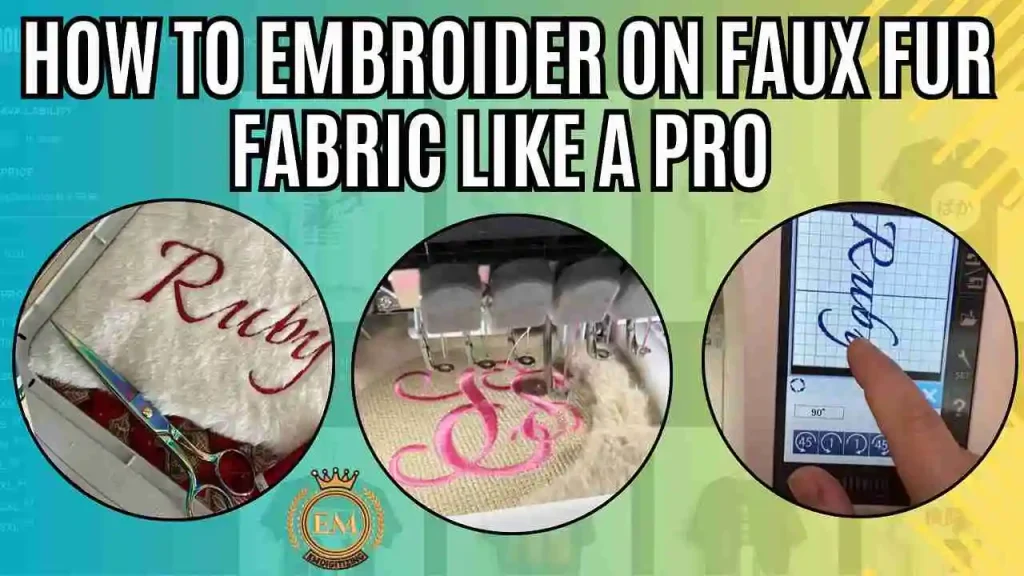
How to Embroider on Faux Fur Fabric Like a Pro?
Essential Materials for How to Embroider on Faux Fur
To achieve the best results on faux fur, using the right materials is essential. Here’s a list of items that will help you create clean, professional embroidery on this unique fabric.
- Faux Fur Fabric
- Embroidery Machine
- Embroidery Needles (sharp or ballpoint)
- Embroidery Thread (polyester or rayon)
- Stabilizer (cutaway or tear-away)
- Temporary Spray Adhesive
- Scissors (for trimming fur and threads)
- Marking Tool (water-soluble or heat-erasable)
- Embroidery Hoop
1. Faux Fur Fabric
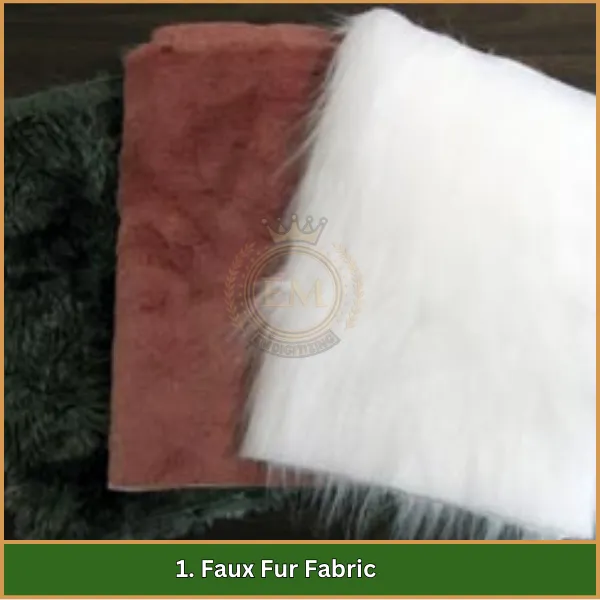
Faux fur fabric is the main material that requires special handling and preparation for embroidery. It comes in various types, including short, medium, and long-pile lengths.
Short-pile faux fur is generally recommended for embroidery as it offers a more stable surface, making the design details more visible and the embroidery process easier. Choosing the right type of faux fur is essential to avoid excessive fluff that can obscure the design.
2. Embroidery Machine
An embroidery machine is essential for precise and professional embroidery on faux fur fabric. A machine with adjustable tension and various stitch options is ideal for working on thick fabrics like faux fur, as it allows more customization and ensures smooth, even stitching.
3. Embroidery Needles
Using the correct needle type is crucial for faux fur embroidery. Sharp needles are recommended because they pierce through the thick fabric smoothly without damaging the fibers. Ballpoint needles are also an option for faux fur with a fabric backing, as they slide between fibers without cutting.
4. Embroidery Thread
Polyester or rayon threads are best suited for faux fur as they are strong and resistant to fading, even on textured surfaces. Polyester thread, in particular, is recommended for durability and color vibrancy, ensuring the design stands out on plush fabrics like faux fur.
5. Stabilizer
A stabilizer is vital for holding faux fur in place and preventing the fabric from shifting. Cutaway stabilizer is recommended for thicker faux fur as it provides firm support. Tear-away stabilizer can also be used if the faux fur is lightweight and doesn’t require as much stability.
6. Temporary Spray Adhesive
Temporary spray adhesive helps keep the stabilizer and faux fur fabric securely in place during embroidery. This prevents shifting, which is common with the fluffy texture of faux fur, ensuring the design stays aligned throughout the process.
7. Scissors
Sharp embroidery scissors are essential for trimming both fur and thread without pulling or damaging the fabric. Smaller, precise scissors are particularly helpful for cutting around the design, giving a clean finish to the embroidered faux fur.
8. Marking Tool
A water-soluble or heat-erasable marking tool is ideal for marking guidelines on faux fur fabric. These markings assist with accurate design placement and can be easily removed after embroidery, ensuring no residue is left on the fabric.
9. Embroidery Hoop
An embroidery hoop is crucial for securing faux fur fabric tightly in place, allowing for accurate stitching. Choose a hoop size that matches your design to prevent shifting, as hooping helps control the fluffiness of faux fur and keeps it from interfering with the embroidery.
How to Embroider on Faux Fur: Step-by-Step Guide
Embroidery on faux fur requires specific techniques to achieve professional results. Follow these steps to ensure your machine embroidery on faux fur looks clean and well-defined.
1. Prepare the Faux Fur Fabric
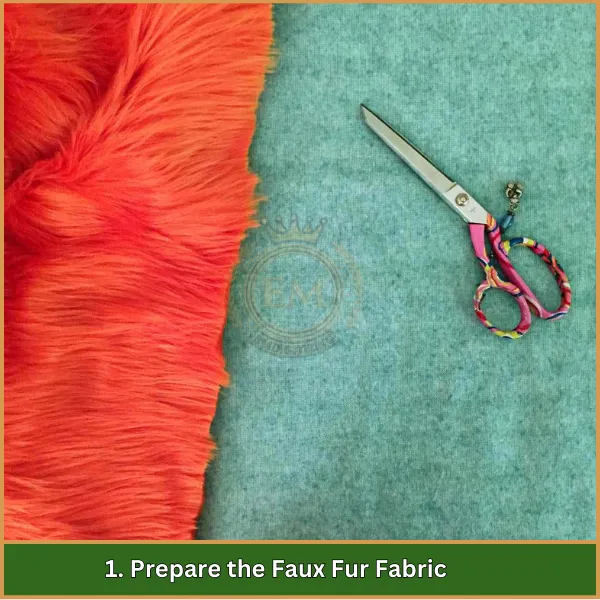
Before beginning, prepare the faux fur by trimming any excess fluff from the area where you’ll embroider. This step is essential if you’re working with long-pile faux fur, as it can obscure the design details.
2. Choose and Secure the Stabilizer

Attach a cutaway or tear-away stabilizer to the back of the faux fur fabric. Use temporary spray adhesive to hold it in place, ensuring the fabric remains stable throughout the embroidery process.
3. Mark the Embroidery Area
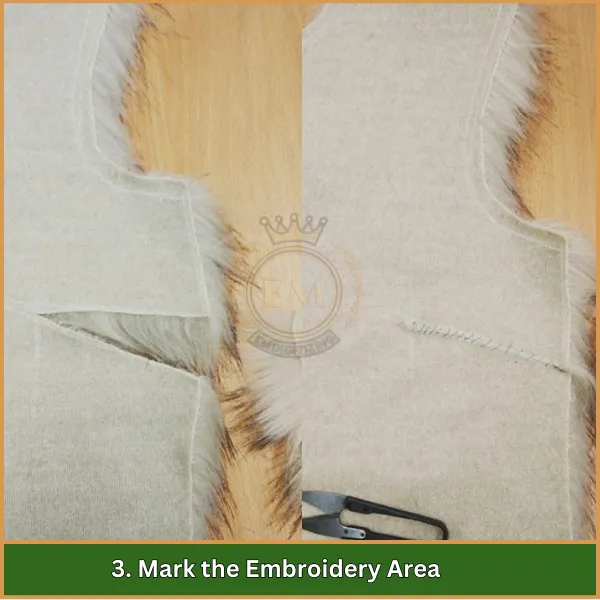
Using a water-soluble or heat-erasable marking tool, mark the center of your design on the faux fur. This marking will help with accurate design placement on the fabric.
4. Float the Fabric and Stabilizer (Instead of Hooping)
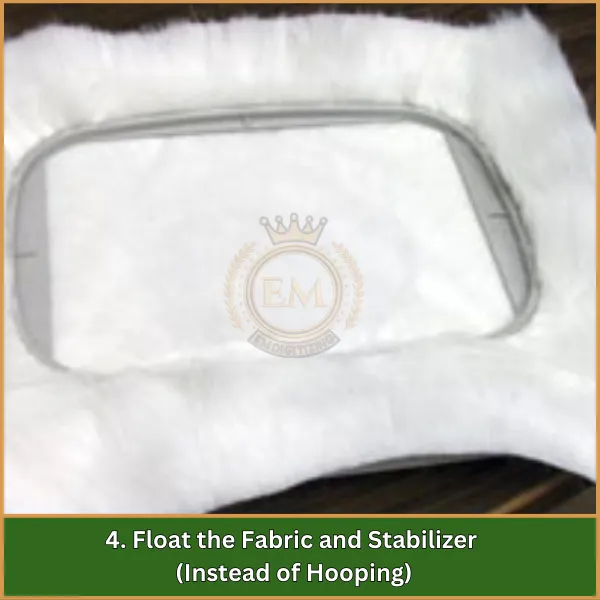
For faux fur, floating the fabric is often preferred over hooping. Place the stabilized faux fur on top of the hooped stabilizer without securing it directly in the hoop. Floating helps prevent flattening the fur and reduces hoop burn, which can leave marks on the fabric.
5. Digitize the Embroidery Design for Faux Fur
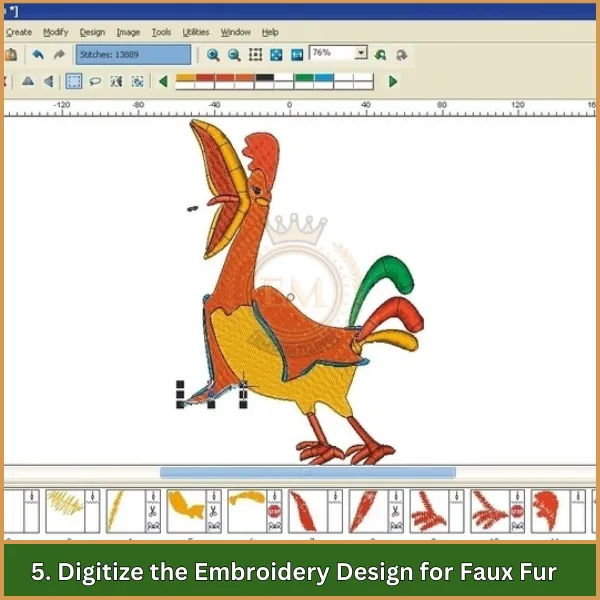
Knowing how to embroider on faux fur successfully starts with the right digitizing. Designs with larger, bolder shapes and lower stitch density work best, as they stand out more clearly on the fluffy texture of faux fur.
If you don’t have a digitized design ready, you can have it expertly digitized through EMdigitizing. We offer high-quality digitizing services at affordable rates, ensuring the best results for faux fur embroidery, with each design optimized for clarity and professionalism.
6. Load and Set Up the Embroidery Machine
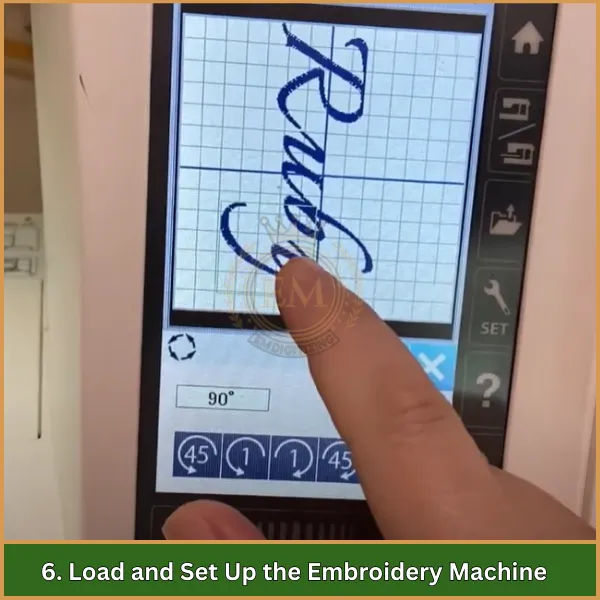
Once your design is digitized, load it into the embroidery machine to embroider on faux fur effectively. Ensure the settings match the thickness of faux fur and set the speed to a slower rate if possible, as faux fur requires more controlled stitching to keep the design aligned and precise.
7. Begin the Embroidery Process
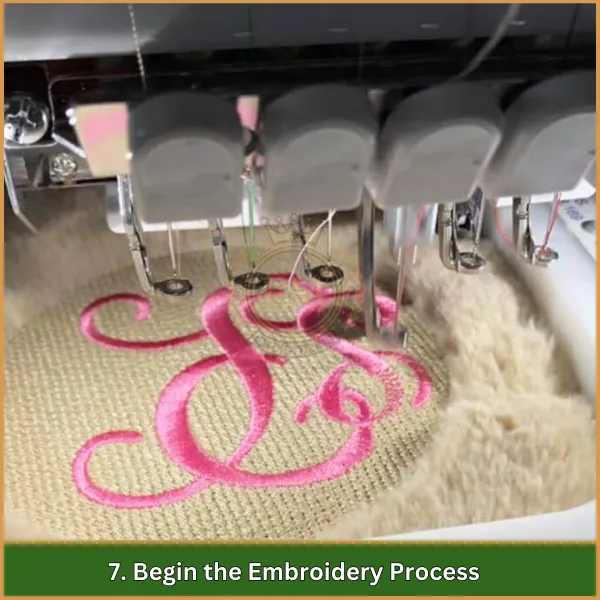
Start embroidering the design, carefully monitoring the process. Faux fur may require slight adjustments or pauses to ensure the fabric stays aligned and the stitches remain clear and defined.
8. Trim and Clean the Design Area
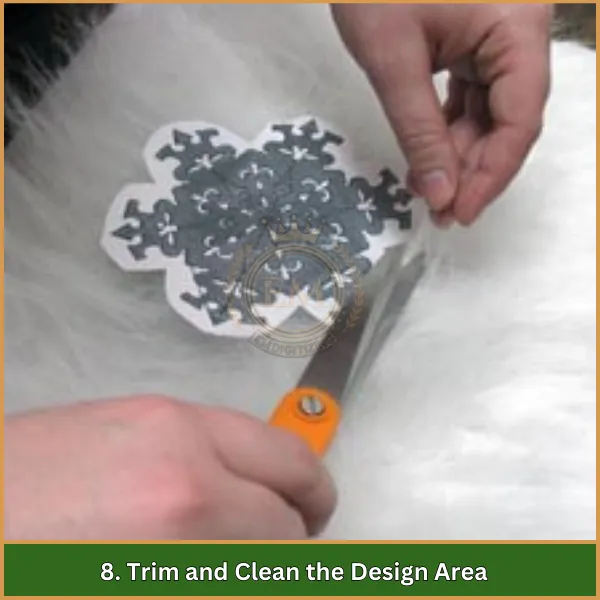
After the embroidery is complete, trim any stray threads and fluff the fur around the design to restore its texture. Take care not to pull too hard, as this could damage the embroidery or fabric.
9. Remove the Markings and Stabilizer
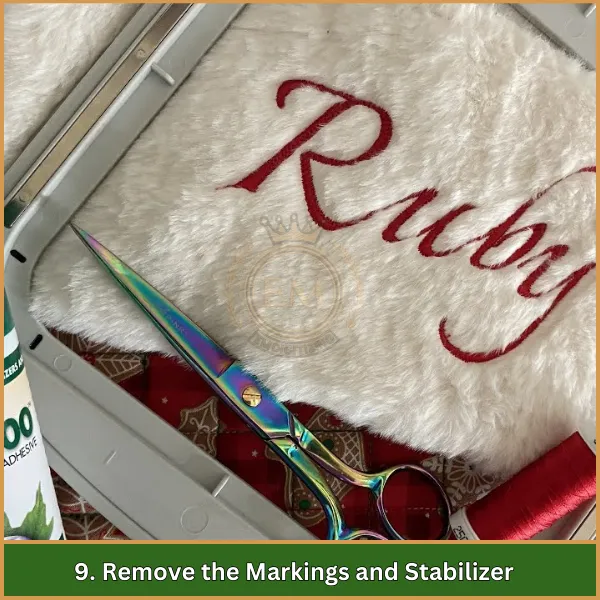
Finally, remove any remaining stabilizer from the back of the fabric. If you used a water-soluble marking tool, gently clean the markings with a damp cloth, ensuring no residue is left on the fabric.
Tips for Digitizing Embroidery Designs for Faux Fur
- Choose Bold, Simple Designs: Avoid intricate details; bold shapes stand out better on faux fur.
- Lower Stitch Density: Reduces matting and keeps the design visible on the fabric’s surface.
- Increase Pull Compensation: Prevents design distortion on faux fur by adjusting for fabric shift.
- Use Satin Stitches for Outlines: Creates bold, visible lines; avoid thin or running stitches.
- Avoid Small Lettering: Use large, simple fonts for readability; small text can get lost in fur.
- Test on Sample Fabric: Run a test stitch to check design appearance and make adjustments.
- Professional Digitizing Option: Get expert digitizing from us for high-quality results on faux fur.
Bottom Line
How to embroider on faux fur can be a fun and rewarding experience when you know the right techniques. By following the steps and tips in this guide, you’ll be able to create designs that truly stand out on fluffy fabrics. Proper digitizing is essential for faux fur embroidery to ensure your design appears clear and professional.
If you need help with digitizing, EMdigitizing offers top-notch services at the most affordable rates, with a super-fast turnaround and guaranteed quality. Plus, we provide a preview option so you can see your design before finalizing.
And if you’re a first-time customer, enjoy a special 50% discount on your order. Let us help you bring your faux fur embroidery to life with expert digitizing!
